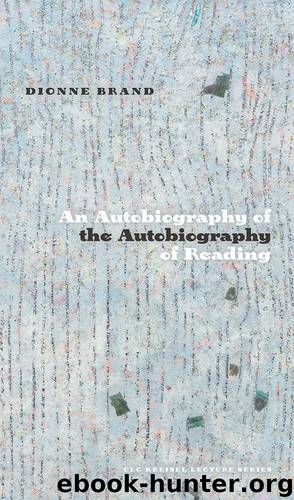An Autobiography of the Autobiography of Reading by Dionne Brand

Author:Dionne Brand [Dionne Brand]
Language: eng
Format: epub
ISBN: 9781772125139
Publisher: The University of Alberta Press
I SPENT THE FIRST seventeen years of my life consuming this literature, passing through its sentences; absorbing its form, its structure, and its aesthetic; coming to know its rules of character, landscape, dialogue, and so on.
In her essay “Novel and History, Plot and Plantation,” Sylvia Wynter writes, “we [by which she means plantation or New World societies] are all, without exception, still ‘enchanted,’ imprisoned, deformed and schizophrenic in its bewitched reality.”17
A narratively constituted imaginary and existence are repeated, reinforced politically and socially, rewritten in every novel either as embedded or as dug up to examine difference or those outside the narrative. If blackness is one of the categories of this narrative schema, then it appears as immutable. This narratively constituted imaginary is a code that considers itself ever changing but is in fact ever elaborating itself as primary—reconstituting the same materials in which it is primary, from which it deals out violence as empathy, violence as love, violence as the daily enactment of itself. Code and algorithms, after all, are not neutral or value-free—they are embedded in, constitutive of, and also produce sets of political and social relations and, of course, literary ones.
Narrative is not just the simple transportation of language but of ideas of the self, and ideas of the self that contain negations of other people. What is it, then, to adopt or be indoctrinated into these narrative structures, those ideas, to come to know those ideas as your own, when you are the negated other people? The intravenous being, the being administered into being, through the idea of the universal that is, at the same time, self-negating?
The first strategy of counteracting the toxicity of colonial narrative may be the counternarrative. I tried to practise a version of this in my 1988 short story, “At the Lisbon Plate,” when finding no name for the murdered man in Albert Camus’s L’Étranger/The Outsider. I tried to imagine his day, his life before and when he encounters the colonial anxiety of Camus’s Meursault, a colonial anxiety whose elaboration is the death of the man on the beach. How Camus un-names the victim and is unable or unwilling to fill out his life or hear his voice. And so, in a brief few paragraphs, I attempted in my early writing life to fill in the register of existence, since the murdered man’s life fell out of the existential rhetorics of this period in French writing. The murdered man was outside of existentialism as I was outside of colonial subjectivity. Even a grand proposition like that of existentialism cannot contain the existence of the colonized. “Ahmed. Ahmed. Ahmed,” my story begins, naming the murdered man. “Ahmed came to the beach with Ousmane to get away…He dropped the bicycle, raced Ousmane to the water…Ahmed and Ousmane fell into the sea fully clothed, he washing away the sticky oil of the bicycle shop, Ousmane drowning his headache.”18 The story settles Ahmed into his life with his younger brother, Ousmane, their getaway to the beach, carving a space away from the penury, the emergencies of the town and their life.
Download
This site does not store any files on its server. We only index and link to content provided by other sites. Please contact the content providers to delete copyright contents if any and email us, we'll remove relevant links or contents immediately.
| African | Asian |
| Australian & Oceanian | Canadian |
| Caribbean & Latin American | European |
| Jewish | Middle Eastern |
| Russian | United States |
4 3 2 1: A Novel by Paul Auster(11052)
The handmaid's tale by Margaret Atwood(6856)
Giovanni's Room by James Baldwin(5879)
Big Magic: Creative Living Beyond Fear by Elizabeth Gilbert(4723)
Asking the Right Questions: A Guide to Critical Thinking by M. Neil Browne & Stuart M. Keeley(4576)
On Writing A Memoir of the Craft by Stephen King(4215)
Ego Is the Enemy by Ryan Holiday(3991)
Ken Follett - World without end by Ken Follett(3973)
The Body: A Guide for Occupants by Bill Bryson(3802)
Bluets by Maggie Nelson(3711)
Adulting by Kelly Williams Brown(3671)
Guilty Pleasures by Laurell K Hamilton(3587)
Eat That Frog! by Brian Tracy(3514)
White Noise - A Novel by Don DeLillo(3436)
The Poetry of Pablo Neruda by Pablo Neruda(3367)
Alive: The Story of the Andes Survivors by Piers Paul Read(3312)
The Bookshop by Penelope Fitzgerald(3229)
The Book of Joy by Dalai Lama(3218)
Fingerprints of the Gods by Graham Hancock(3214)
